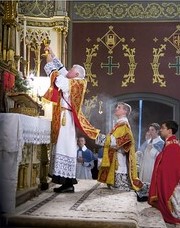|
Home
|
Feb 28, 2023
This week’s themeNouns that are also verbs This week’s words pinion deacon infame scend swan 
A deacon (in the middle) assisting a priest
Photo: Phil Roussin
A.Word.A.Day
with Anu Gargdeacon
PRONUNCIATION:
MEANING:
ETYMOLOGY:
From Old English diacon, from Latin diaconus, from Greek diakonos
(servant, minister). Earliest documented use: for noun: 900; for verb: 1839.
NOTES:
A deacon typically helps with things like ushering, collecting the
offering, visiting church members in their homes, etc.
In churches where not enough copies of religious books were available
for all attendees, a deacon or a choir leader would read one or two lines
at a time before the choir or the congregation would sing them. It’s not clear how the negative meanings of the word arose. Maybe when a deacon visited, a family did a bit of staging: moved their religious music records to the front, brought out their best china, even displayed the best fruit on the table. Maybe it’s alluding to the deacons themselves, displaying goodness on the surface (speaking politely) that hid what lies inside. According to a New England proverb “All deacons are good, but there’s odds in deacons.” USAGE:
“And again, when you catch a fellow off guard who seemed all right the
first time, you may find that he deaconed himself for your benefit, and
that all the big strawberries were on top.” George Horace Lorimer; Old Gorgon Graham; Doubleday; 1903. “‘It’s pretty late,’ Andrew said. ‘Why don’t we just stay at a roadhouse?’ ‘I don’t think so.’ ‘Why not?’ I deaconed. ‘It would be my first time.’ ‘Don’t worry. I’ll show you.’ Girls notoriously claimed they did it because they were drunk. But, in fact, I was drunk -- on euphoria.” Paul M. Levitt; Chin Music; Roberts Rinehart; 2001. See more usage examples of deacon in Vocabulary.com’s dictionary. A THOUGHT FOR TODAY:
The souls of emperors and cobblers are cast in the same mold. The same
reason that makes us wrangle with a neighbor creates a war between princes.
-Michel de Montaigne, essayist (28 Feb 1533-1592)
|
|
Subscriber Services
Awards | Stats | Links | Privacy Policy
Contribute | Advertise
Awards | Stats | Links | Privacy Policy
Contribute | Advertise
© 1994-2025 Wordsmith